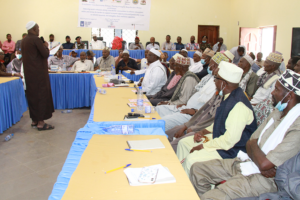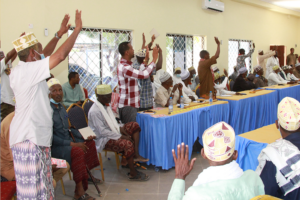Addis Ababa, 27 June 2023 – The Ministry of Peace of the Federal Democratic Republic of Ethiopia and Interpeace, in collaboration with the Centre for Sustainable Peace and Democratic Development (SeeD) and ABCON, today launched the pilot Ethiopian Peace Index (EPI) in Sidama, the Southern Nations, Nationalities, and Peoples Region (SNNPR), and the South West Ethiopian Peoples Region (SWEPR). The EPI is a research initiative that offers a unique tool to understand the state of peace and resilience in Ethiopia, with further analysis on the complexities of conflict and peacebuilding. It also operationalized a new approach to bottom-up and participatory measurement that would provide evidence-based strategies for local and international actors dedicated to fostering peace and reconciliation in the country.
The Index, developed with the support of the Kingdom of the Netherlands, used a participatory quantitative methodology in the three regions mentioned above. Through a comprehensive analysis of data collected from citizens, traditional leaders, and Kebele administrators across 101 Kebeles (small administrative units), the Ethiopian Peace Index has quantified and measured various factors influencing peace, including economic, social, psychological, attitudinal, behavioural, and environmental dimensions.
The EPI emphasises the importance of peaceful community and intergroup relations. While individuals were generally peaceful, communities faced many local violent disputes. In order to achieve enduring peace, it is important to cultivate a sense of harmony among diverse ethnic groups, nurture solidarity, and fortify communal relations. The Index highlights the need for objective decision-making by local leaders, capacity building to reduce bias, and peace skills like social tolerance and inclusive identities. The study also reveals the connections between peace and critical areas such as food security, mental wellbeing, and gender equality. It calls for targeted interventions that address scarcity, promote social cohesion, and empower vulnerable groups.
If the Ethiopian Peace Index expands to include more regions in 2023, it will provide a comprehensive national baseline and enable a comparative analysis of peace dynamics across Ethiopia. It aims to serve as a reliable resource for policymakers, peace actors, and development partners in designing evidence-based interventions and monitoring progress towards lasting positive peace. By adopting a multi-systematic lens and leveraging the insights provided by the Ethiopian Peace Index, stakeholders can address underlying grievances, strengthen resilience, and contribute to a more peaceful and prosperous Ethiopia.
Integrating MHPSS into peacebuilding and transitional justice efforts in Somalia is crucial for sustainable peace and human development. In conflict-affected regions like Somalia, trauma, depression, anxiety, and other mental health disorders significantly impact people’s well-being. Based on a study conducted by the World Health Organization (WHO), it is estimated that one out of every three Somalis experiences mental health challenges. Additionally, the suicide rate among males in Somalia stands at 11.5 per 100,000 individuals, which surpasses the global average. Regrettably, the availability of mental health services remains limited, with only a small number of healthcare facilities providing such support. In a country with a population of 15 million, there are merely three psychiatrists and 22 trained nurses specialising in mental health care due to a lack of funds and professional training. Somaliland published a mental health policy for 2021 to enhance mental health services, including community-based support, training, research, and legislation. However, due to funding limitations in implementing regulations, the adoption of the policy remains pending. By integrating MHPSS programmes, the diverse needs of individuals impacted by conflict and displacement can be effectively addressed.
The current Interpeace programme, made up of a consortium of diverse partners, "Social cohesion and legitimate governance through transitional justice (Miisaan)", focuses on a locally informed and owned process of transitional justice and reconciliation in the Somali context. The consortium recognises the impact of conflict on mental health and emphasises the need to integrate MHPSS into post-conflict justice and reconciliation mechanisms. To foster dialogue and engagement, round table discussions and intergenerational dialogues were organised in Galkayo, Erigaabo, Hargesia, and Mogadishu, involving community leaders, government officials, civil society organisations, traditional elders, youth, and women. The discussions with various stakeholders unearthed issues that need urgent attention to tackle mental health issues. The discussions increased the programme’s understanding of how to rebuild the mental health institutions. To address these challenges, it was agreed that it is crucial to prioritise collaboration between the government and stakeholders to allocate resources to mental health facilities and services, prioritise human rights, and provide training for medical practitioners and service providers as well as peacebuilding practitioners. Additionally, discussions explored traditional and religious practises as coping mechanisms for individuals affected by violence and conflict.
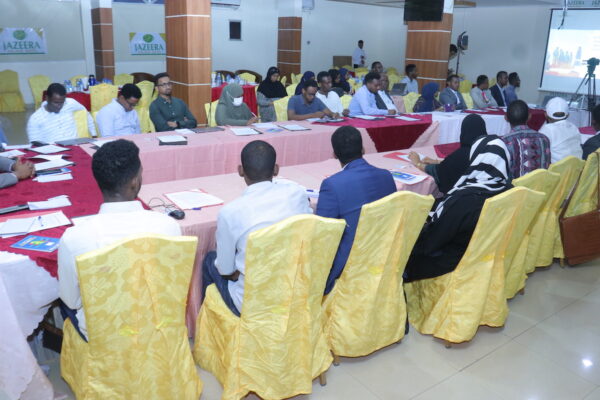
The discussions highlighted various recurring issues, including revenge killings, land disputes, camel theft, targeted terrorist killings, and administrative disputes, that affect communities. Government stakeholders who participated in the discussions, emphasised the relevance of MHPSS in addressing mental health issues and drawing lessons from other contexts that have gone through community resolution experiences.
As an outcome, a roadmap for MHPSS integration will be developed, aligning with national policies, strategies, and resources. This roadmap will aim to promote consensus and commitment among stakeholders to address mental health and psychosocial needs in post-conflict settings and achieve sustainable peace and reconciliation.
The Miisaan programme affirms that integrating MHPSS structures into post-conflict justice and reconciliation mechanisms is essential, considering the adverse impact of conflict on mental health and its hindrance to the peaceful functioning of societies. This integration will contribute to building greater awareness, advocacy, and policy development to create a better future and stronger state-society relations.
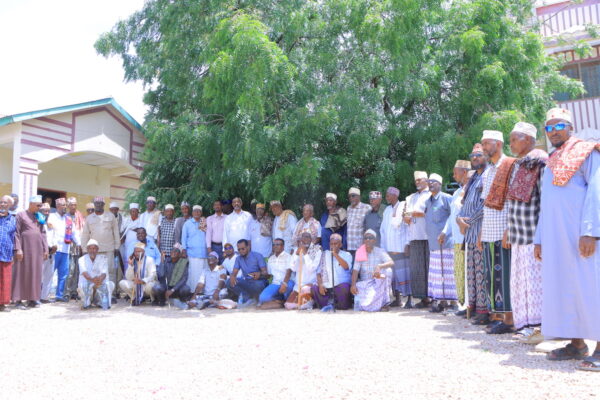
As the sun's warm rays illuminated the arid landscape of Rhamu in Mandera County on the morning of March 11th, 2023, a palpable sense of anticipation filled the air. The Degodia community in Kenya was preparing for a historic meeting that would bring together their kin from across the border in Ethiopia to address the ongoing sporadic killings that had plagued the county, often attributed to cross-border conflicts spilling over to Kenya. Last year, the Banisa sub-county in Mandera experienced conflicts seeping from the borders of Ethiopia's Dawa and Liban Zone, which is home to both the Garre and Degodia communities, respectively. The sporadic killings threatened the fragile peace that had been painstakingly achieved in Banisa since 2018.
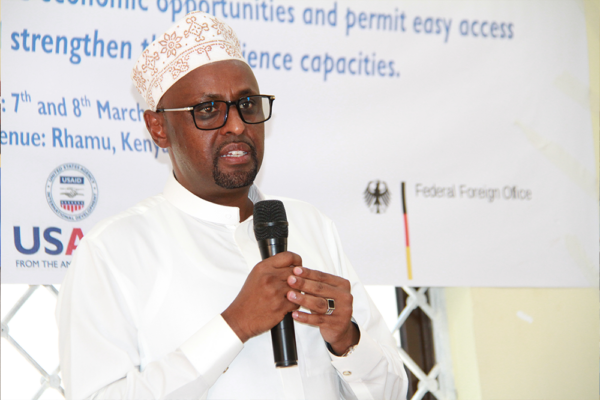
Interpeace, through the Kenya programme and in collaboration with the Mandera County Government, for the first time brought together elders of the Degodia community and representatives from the Degodia clan's King, Wabar Abdille. The attendees included Wabar Abdille's cabinet, the Mandera County Deputy Governor, elected members of the County Assembly, and senior county government officials. Their shared goal was to establish an inclusive cross-border approach to address the conflict triggers and discord in the Banisa sub-county, fostering cooperation and trust between the cross-border communities.
Throughout the meeting, participants engaged in discussions surrounding critical issues. They emphasised the need to break the cycle of retaliatory attacks, build trust in security agencies, and ensure compliance with previous agreements such as the Banisa declaration. Similarly, the elders highlighted the importance of revisiting the Banisa Declaration agreement and proposed revising the document to establish a more binding and comprehensive cross-border agreement that involves the people of Banisa, Malkamari of Kenya, and the cross-border Dawa and Liban Zone of Ethiopia.
In addition, the Ethiopian elders revealed that talks with their Garre counterparts had already begun on the Ethiopian side, signalling promising developments in peacebuilding efforts to initiate efforts to resolve the underlying issues on the Ethiopian side.
"We have taken up the responsibility to amicably resolve issues between the Garre and Degodia clans in Liban and Dawa zones, and we promise that there will be no or less spillovers henceforth," said Sheikh Omar- Advisor to the Wabar Abdille.
Towards the end of the meeting, a significant milestone was achieved. For the first time, the elders signed an intra-community cross-border agreement between the Degodia Elders from Kenya and Ethiopia. The agreement outlined actionable steps, including strengthening efforts to resolve conflicts in Ethiopia's Mubarak District and collaborating with the administrations of the Liban and Dawa zones. Furthermore, the meeting paved the way for future encounters between Wabar Abdille and Sultan Mohamed, traditional leaders of the Degodia and Garre clans, respectively, to initiate effective cross-border peacebuilding collaborations.
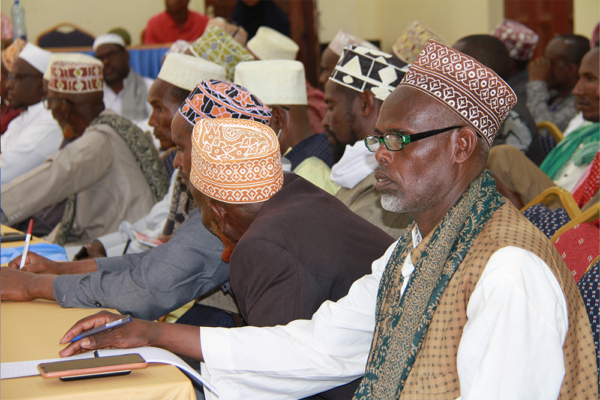
Thanking the delegation who attended the meeting, Interpeace’s Kenya Country Representative, Hassan Ismail, called on the leaders to help pacify the cross-border region.
“We recognise that we cannot sustain everlasting peace by only working on the Kenya side. We shall engage our development partners, specifically the German Federal Foreign Office to also support us in doing similar work in Dawa and the Liban Zone of Ethiopia. That way, local resilience for peace can be assured and sustained.”
The significance of engaging the cross-border community through such an inclusive meeting cannot be overstated. Previous peacebuilding efforts had focused solely on Kenya, neglecting the situation in Ethiopia. The timing of this meeting was crucial, as the Banisa sub-county had experienced an upsurge in cross-border conflicts and retaliatory attacks between November 2022 and February 2023. The gathering instilled hope for a brighter future that would end the conflicts, promote resource sharing, and enhance collaboration between the Garre and Degodia communities in Kenya and Ethiopia.
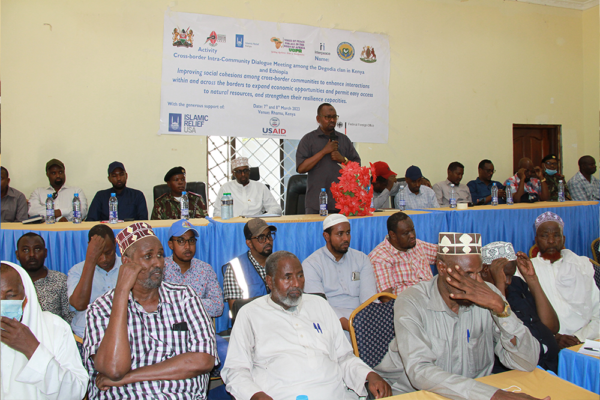
"This meeting has allowed us to achieve what we couldn't achieve for the past decade; it will be the beginning of a long-term peacebuilding engagement with our kin from Ethiopia,” emphasized Haji Bare Hassan, District Peace Committee Chairman, Mandera North Sub-County.
The intra-community dialogue meeting concluded with a sense of unity and optimism, paving the path for future inter-community dialogues scheduled for this year. With the support from the Federal Foreign Office of Germany, the dialogue will, for the first time, bring together Degodias and Garre community members from both Kenya and Ethiopia to establish a sustainable, binding cross-border agreement that would bring the two communities to a uniform resolution, unlike the previous Banisa declaration that was centered in Kenya only.
“Political engagement requires active participation rather than relying on favours. Women should start by getting involved in political activism within political parties and their local communities. This way, when positions are distributed, they are considered for these roles," said Castro Kambulu, an elected representative from Kasai province. Kambulu's statement highlights the challenges faced in promoting gender integration and female leadership. This comment followed a political dialogue held in Tshikapa in May, organised by the Action for Peace and Concord (APC) in partnership with Interpeace and in collaboration with the provincial government. The meeting aimed to implement the project "Strengthening Women and Girls' Leadership for Peace Consolidation in Kasai and Kasai Central" in the Democratic Republic of Congo (DRC), funded by the United Nations Secretary-General's Peacebuilding Fund (PBF).
Led primarily by women, this dialogue provided an opportunity for the 65 participants, including 27 women, to create an action plan for the upcoming elections scheduled later this year. The plan includes a campaign to disseminate texts safeguarding women's and young girls' rights as well as advocacy efforts to ensure gender parity in decision-making positions. Similar strategies will be employed with traditional authorities to eliminate practises that hinder women's participation in politics.
The coordinator of the Binadamu Foundation in action emphasised that leaders and parliamentarians at the provincial level must support this cause by passing policies that promote women's rights. However, the provincial minister of transport and public works, Marie Kinda Kumambange, urged women to take charge of their own destinies, criticising a passive and victimised mindset among some women. She encouraged them to become fighters and refrain from complaining.
During the dialogue, discussions also revolved around legal instruments for promoting women's and girls' rights, such as United Nations Security Council Resolutions 1325 and 2250, specific provisions of the family code and parity law, the Constitution of the DRC, labour laws, and gender-based violence. Working groups were formed to develop a roadmap outlining practical solutions to enhance women's and girls' political involvement at both the provincial and national levels. Participants included provincial deputies, members of the Kasai provincial government, representatives from United Nations agencies, social actors, international organisations, certain traditional authorities, and delegates from civil society organisations.
Finance for Peace, the leading global initiative dedicated to creating norms, standards, research and knowledge to promote investment approaches aimed at fostering peace, is excited to announce the launch of a call for expressions of interest for its Peace Finance Standards Committee (the Standards Committee). The Standards Committee will play a crucial role in developing and promoting Peace Bond Standards as well as Peace Equity Standards that will enable finance to make a positive impact on peace.
“This is a win-win for the finance and peace sectors. We have the best possible finance sector advisors supporting us, growing government support, and we are creating a step-change towards better financial returns and peace outcomes. This initiative is an innovative solution: it brings together private finance and peace at a time when conflicts are on the rise and traditional sources of funding for peace are not meeting the need”, said Simon Gimson, Acting President of Interpeace.
“Peace is a global public good. The aim of the Peace Finance Impact Framework and the Peace Finance Standard is to support and scale more responsible and peace-enhancing investment by the finance sector. And we are now creating a Standards Committee to ensure that the Peace Finance Standard remains internationally credible, evolves with the finance sector’s needs, stands the test of time, and works for both the finance sector and peacebuilders”, Mr Gimson said.
Fiona Reynolds, Strategic Advisor to Finance for Peace, said: "We are thrilled to launch this call for expressions of interest for our Standards Committee, alongside version 2 of the Peace Finance Impact Framework. By assembling a diverse group of accomplished professionals, we aim to develop robust standards that will inspire the integration of peace and peacebuilding principles into financial investment.”
The Standards Committee will bring together accomplished professionals with diverse expertise in finance, investment, sustainability, development and peacebuilding. The Committee will play a crucial role as part of the Finance for Peace initiative, guiding the development of comprehensive Peace Bond and Equity Standards that will promote and create the conditions where capital works for more peaceful, just and fair outcomes.
The call for expressions of interest invites individuals who are passionate about leveraging the power of finance to foster peace to apply for a position on the Standards Committee. Successful candidates will possess an understanding of the intersection between business, investment, development and peacebuilding, along with a track record of exemplary leadership in their respective field. Interested individuals are invited to review the eligibility criteria and application process. The deadline for submitting expressions of interest is 30 August 2023.
The Standards Committee will be composed of an equal mix of representatives from various fields, including the finance and investment sector, as well as the development, peacebuilding and academic fields.
The Standards Committee will iterate, improve and provide strategic advice on the Peace Finance Impact Framework (PFIF) as well as the Peace Finance Standard (PFS) which have been updated to version 2, available here.
Peace Finance Impact Framework and Peace Finance Standard
The Peace Finance Impact Framework and Peace Finance Standard have been developed in collaboration with a wide range of stakeholders from private finance, banking, development finance, impact investment, civil society as well as peacebuilding and development sectors.
The PFIF is a voluntary framework that guides government donors, development finance institutions, private asset managers, banks, and investors as well as peace actors on how investment approaches can realise rigorous and benchmarked peace impacts. By doing so, PFIF-aligned investments can lower risks for investors as well as communities.
The PFIF sets out international best practice for labelling Peace Bonds and Peace Equity investments through a self-certification scheme called the Peace Finance Standard (PFS). The framework describes basic exclusionary criteria, a proposed process and partnership model of how investors can plan, implement, measure and verify peace impacts.
In addition, it suggests an intervention logic of how investors may generate additionality and better outcomes for communities. The PFS and PFIF help investors lower risks for both communities and investees by implementing peace and investment strategies that are better sensitised to political and social risks while also building greater trust, buy-in and certainty through more inclusive investment approaches.
The ongoing updating and strengthening of the PFIF and PFS is a collaborative effort that aims to ensure the framework aligns with the needs and aspirations of the finance, investment and peacebuilding sectors. It builds on significant mapping research that has been conducted by Finance for Peace and various other partners on the existing gaps in current investment frameworks and due diligence frameworks for investing in emerging and frontier markets.
The PFIF (version 2 is available here) is based on version 1 (available here) which was developed in September 2022 after several rounds of feedback and consultation with experts in sustainable investment, finance, peacebuilding, development and academia, and which was published after being presented during the Investing for Peace Conference in Berlin as part of Germany’s G7 Presidency in September 2022.
Further information
Why Peace Finance is needed and why new standards are critical
Currently, 1.8 billion people, almost a quarter of the world’s population, live in 57 fragile and conflict affected countries which are not meeting the Sustainable Development Goals, largely because of ongoing instability, violence and conflict.
Investment into these places is at a ten-year low and existing blended finance approaches are currently not bridging the gap. Feeding into this are poor market perceptions and evidence of systemic mispricing of risks which suppress the supply of scaled and bankable investments in fragile low-income settings. At the same time, there is broad evidence of private and public investment exacerbating conflict dynamics and failing to mitigate risks for investees and communities. Underpinning all this is a significant lack of fit-for-purpose market frameworks, guidance and incentives for public and private investors to help them proactively engage and properly mitigate risks in fragile and conflict affected settings.
There is a drastic need for new investing approaches that lower risks for communities as well as investors so capital can better work for peace. But this cannot happen without standards and benchmarks for peace impact that are trusted, rigorous and have wide stakeholder buy-in.
About Finance for Peace
Finance for Peace operates as a multistakeholder initiative incubated by Interpeace, a leading international organisation for peacebuilding headquartered in Geneva. Finance for Peace seeks to make systemic change in how investment supports peace in the world’s developing and fragile places through developing standards for peace finance, market intelligence, and new partnerships that can scale new peace finance approaches.
Peace Finance Standards Committee expressions of interest and terms of reference
Peace Finance Impact Framework
Interpeace recently organised a Good Peacebuilding in Practice Workshop in Geneva, where representatives from the humanitarian, development, human rights, and mental health sectors participated in an effort to tackle the most pressing issues in our field. During this two-day workshop, Interpeace colleagues were joined by over 25 participants from diverse corners of the peacebuilding sector with the aim of helping each other improve as practitioners through an honest exchange of knowledge and reflections.
In recent years, peacebuilders have put much emphasis on working with the development and humanitarian sectors to operationalize the sustaining peace agenda and to enhance the understanding of the ‘P’ within the HDP Nexus debate. Therefore, it was an opportune time to turn the magnifying glass on our own sector and ask: how are we doing? And more specifically, what can we, as peacebuilders, learn from other sectors in order to continue to grow and improve as practitioners in the peacebuilding field. In her opening remarks, Dr. Rebecca Brubaker, Interpeace’s Director of Policy, Learning and Advisory Services, stated that the two main goals of the workshop were “to have a frank and proactive intra-sector conversation about key debates in our field, and for this learning discussion to be directly informed by other sectors.”
The workshop was organized around three main themes. The first session centered on Accountability in Peacebuilding, paying particular focus to the ethical question of how peacebuilders are held to account by or on behalf of those most affected by their actions. Participants engaged with colleagues from the humanitarian sector on the accountability mechanisms and standards they have implemented, and discussed the different ways in which international and local actors, as well as peacebuilders could enhance accountability in peacebuilding. The second session focused on Balancing protection with connection needs, where participants from the psychological field used scenarios and models from their own practice and experience to trigger a discussion on how to balance connection with protection needs in peacebuilding. The third session looked at how principles of Neutrality and Impartiality inform peacebuilding practice. While principles are firmly established in the humanitarian and human rights sectors (albeit in different ways), peacebuilders often take a more pragmatic, case by case approach, and discussions centered on how different actors in the room consider impartiality and neutrality in resolving dilemmas that emerge in the field.
“It’s the first time I’ve seen peacebuilders and people coming from other sectors discussing and talking about the different principles and perspectives on impartiality and neutrality.” Charles Ndayiziga – Great Lakes Regional Representative, Interpeace
Participants expressed their enthusiasm for spending this time together to discuss and exchange ideas and experiences, as a way to strengthen and improve each other’s work. Interpeace hopes to continue the collaborative exploration of these topics in the future.
